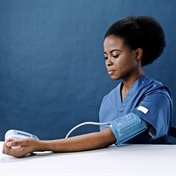- Almost a third of South Africans have high blood pressure.
- Children and young adults are also at risk of hypertension.
- Obese children are more likely to be at risk of high blood pressure.
Hypertension or high blood pressure is due to abnormally high pressure within the blood vessels when the heart pumps blood through the body.
According to the Heart and Stroke Foundation, hypertension is a primary risk factor for cardiovascular diseases, including strokes, heart failure, heart attacks, and angina. It is known as a silent killer as symptoms often go unnoticed.
How common is it in South Africa?
According to a 2021 study published in the International Journal of Environmental Research and Public Health, in 2012, the South African National Health and Nutrition Examination Survey (SANHANES) showed that in 2012, 38.4% of the South African population above 15 years of age had hypertension. In 2016, the prevalence was 48.2%, according to the South African Demographic and Health Survey (DHS).
The DHS also found that the prevalence of hypertension in females was two percentage points higher than in males.
Both surveys show that people at higher risk of hypertension were on average significantly older, more likely to be white or coloured, living in urban areas, obese, and have a previous history of comorbidities like diabetes, high blood cholesterol, coronary heart disease and stroke.
Should young people and children worry about hypertension?
Hypertension does not only affect older people, and young people and children are also at risk. There has also been an increase in hypertension risk over the years. According to the DHS, 20% of males aged 15 to 24 currently have hypertension, compared to 7.7% in the 1998 survey. For males aged 25 to 34, the figure is currently 33%, compared to 15% in 1998.
A 2020 study published in Medicine assessed university students' risk of hypertension in Cape Town. Of the 110 students in the sample, 78.2% had essential hypertension, 14.5% had a secondary cause, including renovascular and renal parenchymal disease, and 5.5% had borderline or high normal blood pressure.
The study also found that a significant percentage of the students' organ damage resulted from hypertension. High-risk behaviour such as smoking and illicit drug use, oral contraceptive use, and obesity were contributing factors. The researchers say that there is a need for a youth target approach to detect and treat hypertension at an early stage.
Children are also at risk in South Africa. According to a 2021 study based in the Eastern Cape, children who are obese are most likely to have high blood pressure. Of the 785 children in the study (between eight and 13 years old), 18% were classified as hypertensive, while 20% were either overweight or obese.
The study authors say that their findings show a need to establish reference tables for elevated blood pressure for South African children.
Sign up for our Daily Dose newsletter here.



 Publications
Publications
 Partners
Partners












